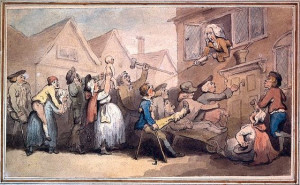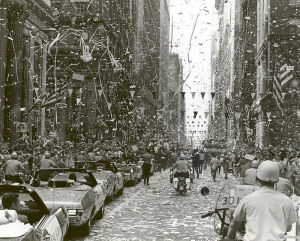
Each member of a legislative body who attends a meeting of that legislative body where action is taken in violation of any provision of this chapter, and where the member intends to deprive the public of information to which the member knows or has reason to know the public is entitled under this chapter, is guilty of a misdemeanor.
Now, that intent element is a little sticky. Evidently it’s not a crime “to deprive the public of information” if you’re just ignorant of the law or too arrogant to understand that the law applies to you or whatever. But at least some members of some groups subject to the Brown Act must be guilty of a misdemeanor when, e.g., they explicitly deny members of the public access to documents which the Brown Act states explicitly must be made available to the public “immediately.” When a member of a body subject to the Brown Act says “no, you can’t look at the document,” the intent is clear. The member “has reason to know” the law because it’s their job to know the law, them being a member of a Brown-Act body. Bang! Misdemeanor. Then how does the law get enforced in such a case?
The procedure is laid out in the Act itself (§54960 et seq.). Either the DA or a member of the public can go to court and ask for injunctive relief of various kinds or else “any interested party” can write a letter to the criminals, point out their crime, give them 30 days to think about it, and allow them the option of promising never to do the crime in the future albeit without admitting that they actually did it in the past. As far as we can see, no one has ever gone to jail for violating the Brown Act (although see this story about a guy in Illinois who placed a whole county board of supervisors under citizen’s arrest).
Now, Los Angeles Municipal Code §41.18(d) states that “No person shall sit, lie or sleep in or upon any street, sidewalk or other public way” in the absence of a parade. We can’t figure out if violating this law is an infraction, a misdemeanor, or a felony, but a law’s a law. And how is this law enforced? By men with guns on the streets of Hollywood. And why is this law enforced? Because the BID, whose board of directors violate the Brown Act with seeming impunity, hires Andrews International Security to send these gunmen out on their bikes and trikes to enforce it.

That’s not how it plays out on the street, though. Just watch these Andrews International employees threaten a homeless man with arrest for sitting on a public sidewalk. Watch them put their hands on their guns when he questions their authority. Watch them try to goad him into sitting down again so they can arrest him. See also how the officers don’t have nametags. Don’t forget the wise words of Monica Yamada, BID board member, who reminds us that people who don’t want to identify themselves must be up to something “sinister.” At least in this case she’s right:
Both images in the public domain. The first because it’s really old and the second because it’s a work of the U.S. government (NASA, if you’re interested) and is thus not subject to copyright protection.
